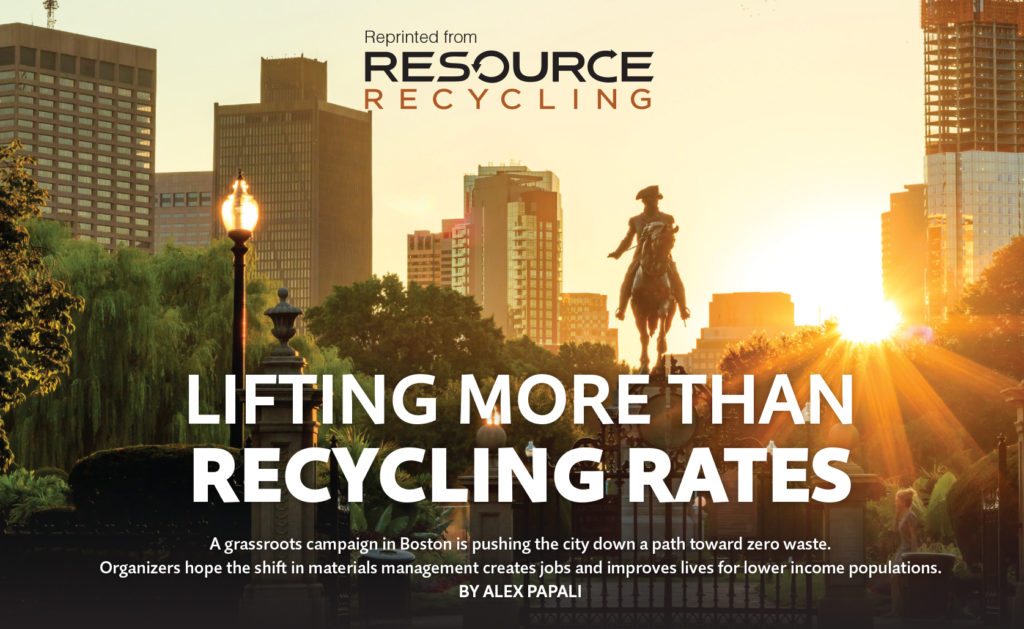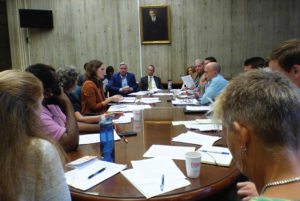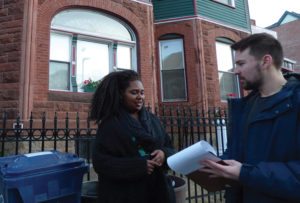This story originally appeared in the December 2016 issue of Resource Recycling.
Subscribe today for access to all print content.
 Boston is on the verge of becoming the first East Coast city to start an in-depth zero waste planning process, through a collaborative effort between local groups and City Hall.
Boston is on the verge of becoming the first East Coast city to start an in-depth zero waste planning process, through a collaborative effort between local groups and City Hall.
The economic potential of the plan is enormous. Boston could sharply reduce its $40 million disposal costs in a few years and even bring in new revenue through its 30 percent profit-sharing arrangement with recycling contractors.
But even more important are the social and human health implications. Underprivileged communities have long borne the brunt of Boston’s disposal-oriented practices and find themselves exposed to incinerator emissions and toxic waste – zero waste is an obvious answer to that issue. At the same time, youth organizers are working with the Boston Public Schools on a climate change and sustainability curriculum, and the possibility of students practicing zero waste in schools every day plays right into the efforts on environmental education.
Furthermore, a small up-front investment in seeding zero waste industries could drive job growth in communities that have often been neglected by previous economic development efforts. These could involve supporting the existing patchwork of reuse and repair entrepreneurs with technical training or business expertise, or growing entirely new sectors like manufacturing with locally recycled feedstock in coordination with cities across the region. These are mostly employment opportunities that don’t require specialized education, and with some effort from City Hall, the jobs could sustain low-income families, help stabilize neighborhoods facing severe housing pressures, and play a small role in maintaining Boston’s diverse neighborhoods.
In Boston, the goal of zero waste is still just that – a goal. The push and pull over policy implementation continues and much work remains. But over the last six years, tremendous gains have been made, and Boston is now in a position to greatly improve the lives of residents by simply thinking about materials management in a smarter way.
Long-held expectations
For years, Boston residents and advocates for effective waste policy expected Boston to be a zero waste leader. The city presents itself as an ideal candidate: wealthy, and with serious green credentials, but lagging in the waste diversion arena. In 2009, the city’s residential waste diversion rate hovered somewhere between 10 and 15 percent. Statistics on activity in the commercial sphere weren’t even available, since the city didn’t regulate that sector.
Local groups active on environmental, workers’ rights and community-development issues recognized there was plenty of room for improvement in how Boston dealt with its waste, as well as local interest in building a grassroots campaign around that goal. Leaders also realized that efforts in Boston could have effects far outside the city limits, since it is the largest city by far in New England and often influences policy across the region. And so was born the Boston Recycling Coalition, an alliance between a range of advocates that had interest in growing the city’s recycling and composting rates.
Partnering groups included Alternatives for Community and Environment (ACE), the Boston Workers Alliance, Clean Water Action, the Global Alliance for Incinerator Alternatives (GAIA), Massachusetts Coalition for Occupational Safety and Health
(MassCOSH), the Toxics Action Center and Youth On Board, among others.
Right from the start it was clear funding this work would not be easy, since it didn’t fall neatly into one of the buckets laid out by the usual private foundations that help pay for these kinds of campaigns. But with resources pooled by the partnering groups, things got off the ground.
From there, coalition members mostly just got a sense of the basics in this new territory, combing through city contracts and state waste data, mapping the political landscape, and laying the groundwork for a well-informed and powerful grassroots campaign. There was a need to overcome internal barriers too – how, for example, could partners bridge some of the unfamiliarity between neighborhood groups representing low-income communities of color and downtown environmental groups?

At a meeting last year, members of the Boston Recycling Coalition presented important aspects of the zero waste campaign to city and state officials.
Between navigating those waters and the lack of understanding of the current system, it would be a couple of years until folks could credibly propose alternatives to the status quo. Luckily, a network of practitioners well-versed in waste policy and alternative systems had been watching and offered to assist. Zero waste soon became the campaign’s mantra as it became clear zero waste was a viable solution to problems that organizers had previously thought of as separate – with distinct sets of targets and policy keys.
High standards for safety and pay
One particularly egregious situation was the exclusion from the city’s living wage ordinance of a largely Latino workforce at the facility holding the city’s recyclables processing contract. Even the city councilor who had written the ordinance was surprised to hear about the exemption.
MassCOSH had been tracking the situation and documented abuses that were typical across the industry: the use of minimum-wage workers and temp workers who are often poorly trained or exposed to unacceptable health and safety hazards. Apparently, when no entity bidding on the contract was willing to offer the living wage, the City had simply issued a legal opinion that this wasn’t a service contract after all but rather a sale of goods to a third party (the service contract component is what triggers the living wage requirement).
According to Tolle Graham, MassCOSH labor and environment coordinator, “There is a history with the low wage, immigrant workforce who sort our city’s recycling waste of experiencing fear and intimidation, which has been a barrier for them to organize for better conditions.” A pillar of the BRC effort is ensuring that a zero waste plan leads to contracts and jobs that set high standards for safety and health and promote family-sustaining wages.
Another major issue, which always had affected policy decisions, was what to do with the trash generated in Boston. “For decades, Boston’s waste has been burned and buried in communities outside of the city, often in places like Saugus, Mass., where residents have borne the brunt of incinerator pollution and a toxic unlined ash landfill,” said Katelyn Parady of Toxics Action Center, a New England nonprofit group that organizes with communities facing local environmental hazards. “Fixing the problem upstream is a no-brainer. The best way for Boston to take responsibility for its mess is to move rapidly toward zero waste.”
The overriding goal of BRC was to amplify to city officials the many benefits of creating a zero waste plan. Jobs creation was a major message, after national partners including GAIA and unions found that increasing national recovery rates from 34 percent to 75 percent would create 1.5 million new jobs. As the city’s waste and recycling contract renewals approached, there was extensive examination of budget savings to be had with diversion from incineration.
Community advocates hosted meetings and door-knocking sessions educating residents about these economic development opportunities and job creation that could come with an overhaul of the trash system, as well as the disproportional impacts that waste facilities have on disenfranchised communities.
The enviros found a waste policy handle in Boston’s revamped Climate Action Plan, and talked up the significant climate emissions reductions from avoiding toxic incineration and moving toward zero waste. “Even before the city implements widespread programming, the zero waste movement in Boston has made its mark nationally by integrating the need for fair treatment of recycling workers and climate policy success with waste diversion goals,” said Monica Wilson of GAIA.
Taking the argument to City Hall
Organizers felt it was important to make it easy for decision-makers to get a sense of what had already worked, which took the form of a menu of options. The BRC built a task force representing a wide range of waste generators and materials diversion stakeholders, and these representatives examined what had and had not worked in other cities.
The result was a report, called “Don’t Waste This Opportunity,” delivered to City Hall in March 2014. It listed a set of short-, medium- and long-term policy recommendations for reaching 50 percent diversion by 2020, 75 percent by 2030 and zero waste by 2040. Contributions from so many stakeholders across the community strongly influenced the policy landscape and provided a solid foundation for discussing alternatives. The report also showcased the widespread local expertise, with industry, academic, institutional and municipal waste people willing to contribute and move forward the goal of zero waste in Boston.
Meanwhile, members of BRC groups representing mostly low-income black and Latino workers got together and decided they wanted to put all this talk into action. The coalition secured a grant to pilot Boston’s first worker-owned waste diversion cooperative, and now, four years later, a promising organics diversion business called Cooperative Energy Recycling and Organics, or CERO (Spanish for “zero”), is turning heads around the country as a successful example of the potential in this sector.
CERO raised capital using innovative community financing methods, including a direct public offering, in which 83 people purchased $350,000 in dividend-paying shares. CERO now provides seven living-wage, worker-owner positions to local residents, who collect commercial food waste, then return the composted soil to local urban farms. Those farms then supply local responsible restaurants, embodying the circular economy that BRC envisions.
“Residents in Boston’s communities of color are acting on the potential for innovation in local circular, zero waste economies that build resilience, local wealth and cooperative ownership,” said Lor Holmes, CERO general manager and worker-owner. “The CERO co-op is but one example of what is possible when we reimagine a world where we don’t have to import our food or export our waste.”
BRC, meanwhile, jumped at the chance to facilitate the participation of key city departments needed to move a planning process forward. GAIA made possible a trip for Boston Public Works staff to head to San Francisco and see first-hand the successes of a city that has long been a leader in waste diversion.
After a new mayor, Marty Walsh, was installed in 2014, the campaign developed mutual trust and found city staff were willing to work with outsiders on a potentially far-reaching zero waste planning process and policy framework. Organizers identified many other city departments with a potential stake in waste policy, including Economic Development, Housing, Schools, Public Health and others, and got to work cementing those connections.

Environmental and workers groups have joined together in Boston to educate residents of economic benefits tied to zero waste planning.
Finally, to meet the desire for direct information from cities leading the way on zero waste, BRC applied for funds from the state for a zero waste summit. Boston city councilors unanimously signed a letter supporting the summit’s goals, and the administration agreed to co-host it. In April 2016, high-level staff from Austin, Los Angeles and San Francisco presented their experiences to 10 Boston city departments, as well as waste staff from towns across eastern Massachusetts.
Moving forward but frustrations remain
So where exactly does the campaign sit as 2016 comes to a close? The chief of the Boston Environment Department has stated a commitment to a zero waste planning process and agrees it fits under the rubric of the Climate Action Plan. There is general agreement on an implementation timeline similar to BRC’s, and the City is seeking funds for a planning process. From the beginning, this has been an effort across class and race divisions, binding together non-traditional constituencies as allies in an unlikely quest. After all this time and shared effort, a planning process represents a significant win.
Furthermore, cooperatives and local businesses around the country have been following the growth and success of the CERO cooperative. And when the city starts implementing innovative organics and other zero waste programs, cities around the country will learn and benefit from Boston’s example.
But when recycling workers continue to be exploited at poverty wages while large out-of-state contractors continue cashing in without improved practices, major campaign goals remain unaddressed. If the massive industry growth the campaign envisions becomes a reality in coming years, it cannot be allowed to replicate the worst parts of the old system. Local folks must see the economic benefits of this overhaul, or it simply will not succeed. After all, people will need to change deeply ingrained habits for all this to work, and it’s hard to get excited about an industry that’s treating your neighbors unfairly, or sucking all the profits out of the community.
Taking the high road on waste policy will offer residents a lot more to get excited about, and residents make the best ambassadors for any city program. The BRC plans to focus on ensuring a fair and sustainable labor and economic development platform is put into place as zero waste is implemented in the coming years. Campaigners are already gearing up to ensure that a planning process brings out a full range of stakeholders – and that the final plan addresses everyone’s needs and interests fairly. We will soon see whether the results made the hard work worthwhile, and whether others find any lessons that help them build their own triple-bottom-line campaigns.
For the BRC, while the moment is one to savor, there’s plenty of work ahead.
Alex Papali is the green justice organizer with Clean Water Action–Massachusetts. He works on distributed energy and zero waste campaigns with the organization, which is a member of the Boston Recycling Coalition.

